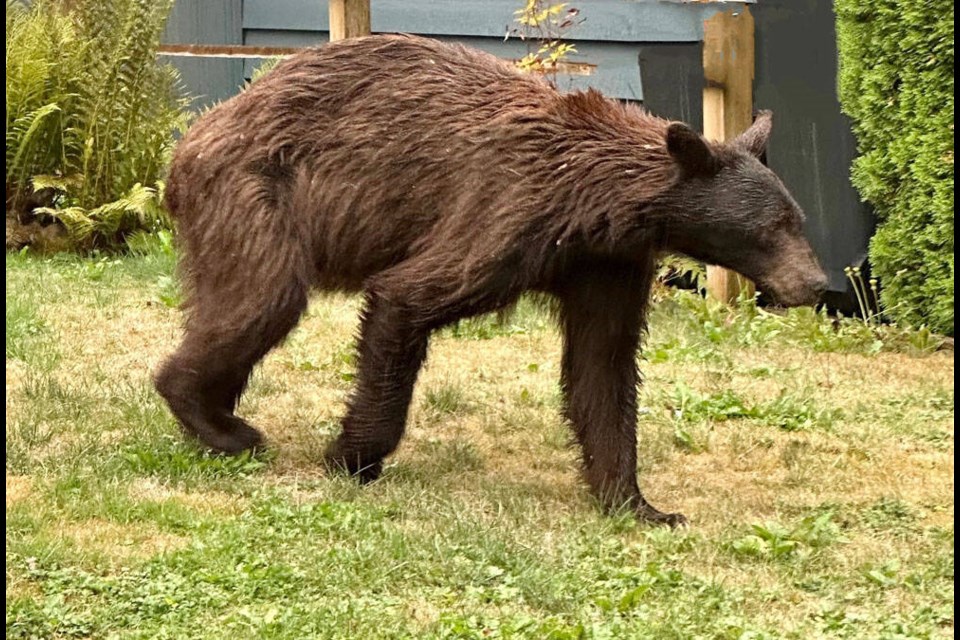There have been three bears killed on the North Shore so far in 2023, and if everyone cleans up their act, that number shouldn’t climb any higher.
The North Shore Black Bear Society is urging residents to be extra cautious with attractants as bears are about to begin packing on pounds in preparation for winter.
“We’ve had a super busy summer,” said Holly Reisner, co-executive director with the society. “We’ve had a lot of calls and reports.”
Despite the dry weather, the berry crop has been good this year, and salmon are now returning to local creeks, providing healthy natural food sources. But Reisner said they are seeing a lot of evidence of bears accessing residents’ garbage, bird feeders and backyard fruit trees.
Even though black bears will gladly get fat on humans’ garbage, it can be deadly for them. The Black Bear Society is aware of one emaciated-looking bear that has been popping up between Dollarton and Lynn Creek, sometimes even in the busy commercial area along Main Street.
Based on photos, Reisner said they estimate he is about a year-and-a-half old, but seriously underweight.
“We’re seeing this poor guy moving around, just so skin and bones and in poor condition… (Our wildlife vet) thinks that this bear is very undernourished and he thinks it’s possible that he could have an intestinal blockage from eating garbage,” she said, stressing the importance of keeping bears out of the trash. “They ingest an incredible amount of plastic. I’ve seen bear scat, which is just 100 per cent plastic bags.”
Because of his age, the bear wouldn’t be eligible for rehabilitation at Critter Care, Reisner said, and so it’s likely he would be euthanized if trapped.
“Poor little guy,” she said. “And there’s nothing we can do.”
Bear by Main Street and Brooksbank Avenue
by u/Swetalian in NorthVancouver
The District of North Vancouver has issued 600 $100 fines for garbage infractions in 2023. By this time last year, there were 1,036, according to the district.
Over and above following the local bylaws on garbage day, Reisner said everyone in bear territory should be freezing their most odorous organics like meat, fish, bones and grease right up until it’s time for collection at the curb. After the garbage is gone, Reisner recommends washing bins with either vinegar or pine scented cleaner, both smells that bears don’t enjoy.
“Now is a really good time to think about how you manage your attractants and practice getting that under control before the fall because they can feed up to 20 hours a day,” she said. “It’s all about controlling the odour.”
This is also a critical time to pick any fruit out of local trees, before it draws bears into conflict, Reisner said. The District of West Vancouver recently had volunteers from the North Shore Fruit Tree Project come harvest from a historic apple orchard planted at what is today the sixth hole of Gleneagles Golf Course. That fruit will all be donated to local non-profits.
Two of the bears killed this year were shot by conservation officers in West Vancouver after the ursines pushed their ways into homes in the British Properties.
One bear was found badly wounded in a North Vancouver yard, likely from being struck by a driver on the roads in Lynn Valley, before conservation officers came to euthanize it, Reisner said.





